Window Tour Part 2
Journey around the windows continued
Window Tour Part 2 - Window 10 to 17
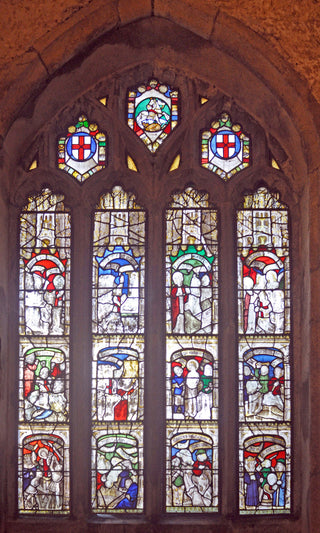
TEN
St George Window
The St George window is one of the more enigmatic windows in the church. Quite how the patron saint of England ended up in Cornish Church is a mystery. It is the most gruesome of all the windows featuring the tortures of St George. The tracery lights figure the medallion of the Order of Red Cross Knights where George slays the dragon with the symbols of St George to the left and right.
St George Window Description
Main lights
St. George fighting the Gauls | St. George beheaded by the Gauls | The Virgin Mary resurrects St. George from the grave | The Virgin Mary arms St. George | St. George kills the dragon | St. George is captured and brought before the King | St. George is lacerated with whips | The Emperor's son rides him like a horse | St. George is tied up and weight tied to his feet | St. George is lowered head first into a vat of molten lead | St. George is dragged by wild horses | St. George is beheaded
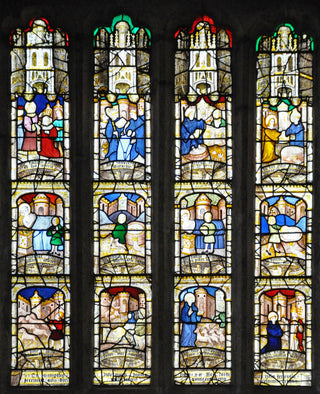
ELEVEN
ST NEOT WINDOW
This window gloriously displays the life of St Neot. Manufactured and inserted in 1530, the donors are thought to be the “Young Men of the Parish”. While you stand admiring it look up at the roof bosses where you will see more fish. Look out for the modern glass which is pale blue.
St. Neot Window Description
Neot's abdication, and the coronation of his younger brother who is kneeling to receive it | Neot here is taking the vows of a monk | Neot reading his pslater with his feet in the well, saves a doe from the hunter (also this scene is on the pulpit). The hunter, awestruck by this is offering his horn to the saint | Neot finds three fishes in his well: an angel tells him that he may eat one a day, but leave the other two fish, and the next day there would be three again | From his sickbed, Neot instructs his servants Barius to bring him a dish from the well | Barius takes two fish from the well (when Neot falls sick), fries one and boils the other, leaving only one in the well | Barius brings two fish to Neot |Barius is sent back by Neot to throw the two fish into the well, where they are restored to life | A thief drives away the Neot's oxen | A man and a boy are ploughing with four stages which at Neot's prayers offered themselves to the yoke | One of the robbers (terrified by the miracle) brings the oxen back. Deer take the place of the stolen cattle and hitch themselves to the plough | Neot receives the Pope Martin's blessing at Rome.
The wording at the bottom translates as “At the cost of the young men of the parish of St Neot, who erected this window, AD 1528.” It is thought that Hedgeland in his restoration gave the window the wrong date and it should read 1530.
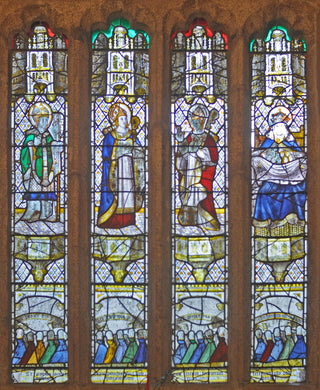
TWELVE
Young Womens Window
Dating from 1529 this window is named after its donors who are pictured kneeling at the base of the window immortalised in glass for nearly 500 years.
Young Womens Window Description
Upper lights
St Petroc shown as a bishop, patron of Bodmin. He is rendered as St Patrick in the inscription below | St Clair (Or Clarus) show as a bishop. He is an English saint to whom the neighbouring parish church in St. Cleer is dedicated | St Manac (or Mancus) show as a bishop with his crozier. It is said he was buried at the nearby parish of Lanreath | All Saints: This is presented by God, dressed in ermine and wearing a crown, holding all the saint in his bosom. This interpretation has been the subject of debate. The Rev'd Henry Grylls writes that this is the Welsh saint St. Brechan holding 11 of his offspring who settled in Cornwall.
Lower lights
The lower lights feature the young women kneeling holding rosaries.
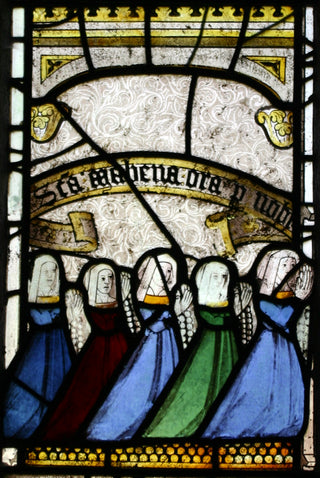
THIRTEEN
Wives Window
This window was paid for by the wives of the western side of the parish in 1528
Wives Window Description
Main lights
St. Mabyn (or Mabina), a female saint, one of the daughters of King Brechan stands wearing a crown | The Virgin Mary with her hands clasped in grief as her dead son lies in her lap | Christ risen from the grave. He displays the five wounds whilst still wearing the crown of thorns | St. Mewbred, the patronal saint of the nearby Cardinham parish. Dressed in monk’s robes and wearing a brass skill-cap, he holds a head. This shows he became a martyr by decapitation
The inscription at the base translates as “At the cost of the wives of the west side of the parish of St Neot, who erected this glass window AD 1530.”Again, Hedgeland restored the incorrect date and it should have read 1528
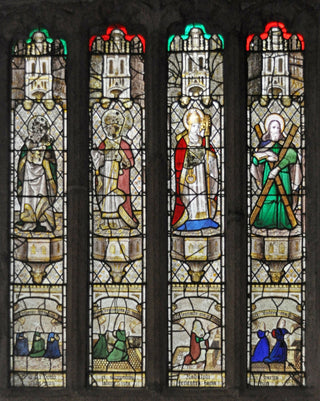
FOURTEEN
HARYS WINDOW
The Harys window is of particular interest to glaziers and artists as it contains one of only three known portraits of an English glass painter, Ralph Harys being both donor and glazier. Mattingly informs us that Ralph Harys and his team probably glazed all the north aisle windows as these are stylistically similar with identical corbels below individual saints. Ralph is depicted kneeling with his wife in the fourth panel. He wears a distinctive purple livery hood.
Harys Window Description
Main lights
St. John the Baptist. In his left hand is a book with a lamb on it. His right-hand points to it. | St. Gregory depicted as a Pope distinguished by his triple crown and double-crossed staff | St. Leonard depicted as a bishop | St. Andrew leaning on his cross
Lower lights
Three boys kneeling | A man and wife kneeling holding rosaries. He has a livery hood and is possibly Ralph Harys junior | A man kneeling before an altar possibly Henry
Courtney, Earl of Devon | A man and wife kneeling before an altar. He wears a livery hood and is probably Ralph Harys and his wife
The inscription at the base translates as: “At the gift and cost of Ralph Harys, and by his workmanship, this window was made”.
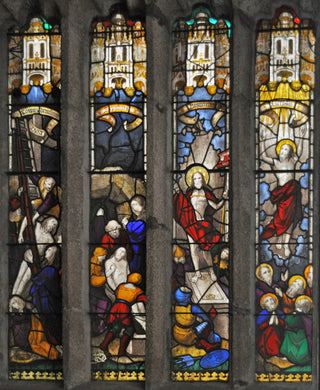
FITHTEEN
Redemption Window
The main body of the window contains four completely new designs. The St George window occupied this space until moved to its current position
Redemption Window Description
Main lights
Joseph of Aramathea taking down the body of Christ and the three Marys receiving it | Joseph places the body in a stone tomb assisted by a Roman soldier | Christ is risen and is standing on his tomb | The Asencion with the Saviour in the air, hands extended towards Heaven
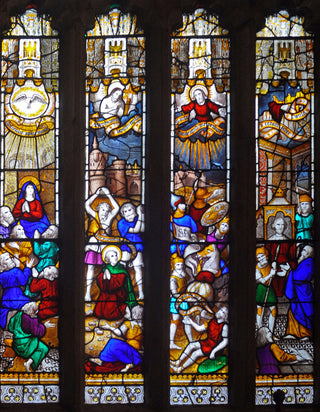
SIXTEEN
Acts Window
This is a modern window created largely by Hedgeland in 1830. The tracery lights feature at their centre the Coronation of the Virgin Mary, on the left is St Barbara and on the right is St Catherine of Alexandria.
Acts Window Description
Body of the window
The descent of the Holy Ghost in the form of a dove to the disciples on the Day of Pentecost | The stoning of Stephen | The conversion of Saul | Paul pleading before Felix (the Roman governor)
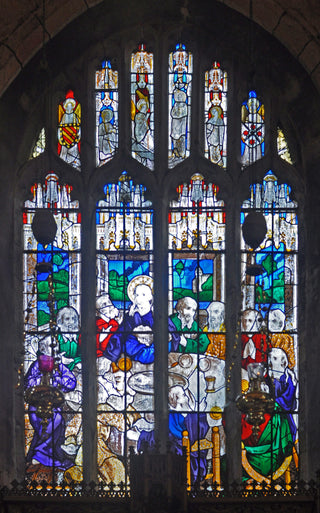
SEVENTEEN
Last Supper Window
The Last Supper window is above the High Altar. It was thought that the original design featured the Last Supper which was completely dilapidated. This new design is based on 15th century colour print found in the British Museum. However, the glass in the tracery lights of the window dates from 1460s. This window features Christ immediately facing you as you view it, with the apostles seated around the table.
Last Supper Window Description
Tracery lights are original and date from around 1500
Angel with Valletort arms | Female saint with cross staff | Archangel Gabriel | Female saint with sceptre/cross | Angel with the Luscombe Arms
It was recently restored and is now safely encased in its protective glazing and new stonework